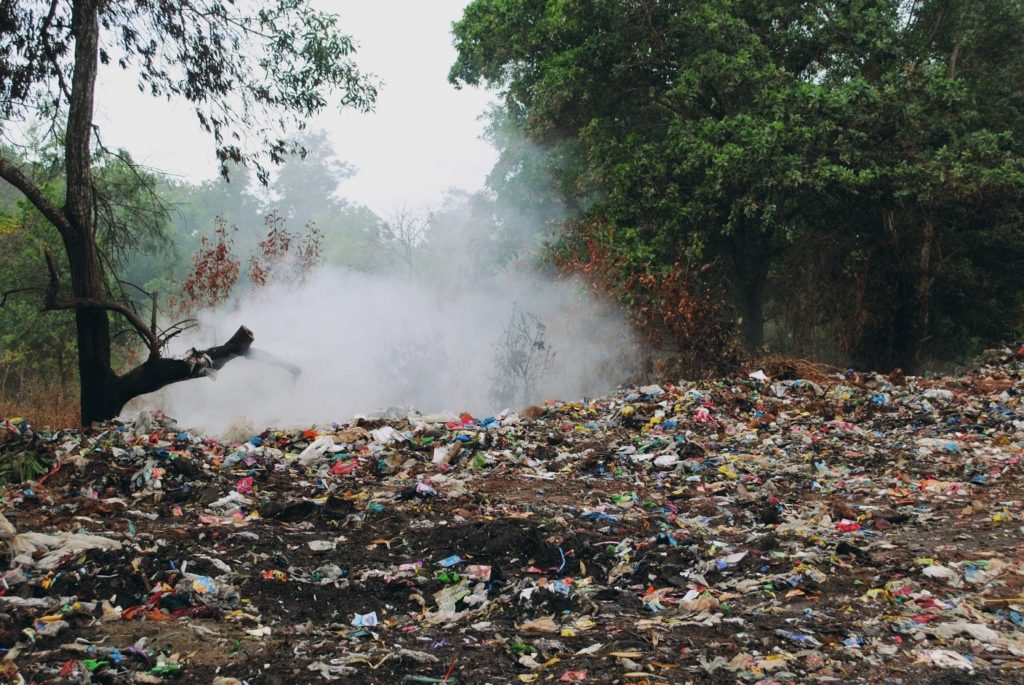DELHI – The invention and introduction of plastic were hailed as a major development in the realm of scientific research that would impact the entire world. There is no doubt that it has, but the impact has not always been beneficial. Decades later, we face a major unintended consequence of this miracle product. It won’t go away. Plastic Pollution.

Plastic has become one of the worst pollutant problems in the world. The profuse amount of plastic waste fills garbage dumps, slums, city streets, beaches, rivers, and increasingly larger areas of our oceans.
Unless plastic is incinerated (in which case, harmful carcinogens are released into the air), plastic is virtually indestructible, even at a micro level. Finely ground plastic is still plastic that can harm land and sea animals, birds, and, yes, even humans.
The Plastic Pollution Problem
Animals eventually die “a slow and cruel death” by ingesting discarded plastics. Birds and fish suffer the same fate but they also face the danger of becoming entangled and entrapped by the plastic waste of various types, leaving them as helpless prey for predators or in other predicaments that make their life unsustainable.
Incinerating plastic releases dioxin into the air which, according to the World Health Organization (WHO), “is toxic to humans and when inhaled through exposure to fumes can accumulate in the human body and be transmitted from mothers to babies via the placenta. Dioxin attached to dust also falls onto waterways and crops.”
Plastic waste that reaches the oceans kills more than a million marine animals each year.
The Global Scope of the Plastic Problem
Here are just a few global statistics published by WHO in June 2018.
- Plastic accounts for about 10% of all of the waste we generate.
- Every year the world uses up to 500 billion plastic bags;
- Each year, at least 8 million tons of plastic end up in the oceans – the equivalent of a full garbage truckload every minute;
- In the last decade, we produced more plastic than in the whole of the last century;
- 50% of the plastic we use is single-use or disposable;
- We buy 1 million plastic bottles every minute.
A 2017 report by Orb Media, entitled “Synthetic Polymer Contamination in Global Drinking Water” concluded that:
83% of tap water samples taken around the world contained plastic pollutants . . . and showed that with a contamination rate of 94%, tap water in the United States was the most polluted, followed by Lebanon and India.
The Scope of the Plastic Pollution Problem in India
A March 1, 2019, report in India Today describing some of India’s campaign to eliminate the country’s plastic pollution problem noted that
- Indian cities generate 15,000 tons of plastic waste which is enough to fill 1500 trucks a day across the Indian cities.
- About 94 percent of this comprises thermoplastic, such as PET (polyethylene terephthalate) and PVC (polyvinyl chloride), which is recyclable.
- India’s four metros generate more than 1760 tons of plastic every day, which is over 40 percent of the plastic waste produced in India’s major cities.
CNN reported last year that India generates a total of nearly 26,000 tons of plastic waste per day.
India Is Focusing on Solutions for the Plastic Problem
India was the host nation for World Environment Day 2018 – an observance held annually on June 5. During the conference that focused on plastic pollution, India pledged to phase out consuming single-use plastics by 2022.
Prime Minister Modi affirmed that “We are at a historic moment. Every age defines its character, and, each generation is remembered for how it rose together to meet its challenges. Our generation must recognize and reaffirm our commitment to sustainability and climate health.” In keeping with his commitment, India has launched a nationwide campaign to begin cleaning plastic waste from “beaches, national parks, riverbanks, public places . . . thereby reinforcing its culture of sustainable living.”
India’s commitment can be evidenced, in part, by more than 60 progress reports in 2019 alone posted on the India Environment Portal. India’s aggressive campaign is part of $139 billion spent annually to reduce plastic pollution.
Help Is on the Way – from Israel
Inspired by years of research in finding an environmentally-friendly alternative to plastic, a product developed in Israel by Sharon Barak, a chemical engineer, has resulted in the formation of a new company, Solutum, that will concentrate on “clean tech” beginning with her new biotechnical solution.
Her eco-friendly compound, AD204, looks like plastic and performs like plastic but is “100% environmentally friendly” and is biodegradable in water.
What is more, assuming the new material is dissolved in clean water, that water remains safe to drink after the plastic substitute has liquified.
Her product is as easy to use as plastic and it is just as easy to produce. Manufacturers can commit to producing the product without additional capital investments because they can use the equipment they currently have in place.
Surely, her biodegradable alternative to plastic will become one of the greatest inventions of the 21st century. With India leading the way to address the global plastic pollution problem, Solutum may become one of the country’s best partners.
To read more news on Humanitarian Services on Missions Box, go here.
Sources:
- India Environmental Portal, Plastics
- India Today, Plastic-free India anthem released in 7 languages by Environment Minister
- CNN, India’s Modi calls for a crackdown on plastic pollution on World Environment Day
- Wikipedia, Plastic pollution
- World Environment Day, India: a land of unity in diversity
- World Environment Day, UN Environment releases 2018 Annual Report
- World Health Organization, World Environment Day 2018: a call to “Beat plastic pollution”
- GOD TV, Israel Does It Again… Jewish Woman Invents A Replacement For Plastic
- Orb Media, Synthetic Polymer Contamination in Global Drinking Water
- Solutum, The Formula that Bonds with Nature




